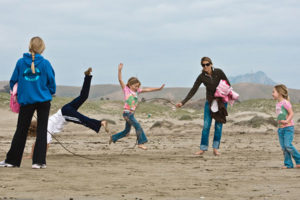All Work and No Play

If we are not careful, our minds get so busy dealing with the problems of life that we don’t take time out for positive physical, mental and social activities – instead it is easy to get into the habit of ‘rewarding’ ourselves and our children with escapist things like TV, computer games, junk food, shopping, 24-hour ‘news’, laziness, and even ‘recreational’ drugs like sugar, alcohol and caffeine.
By creating opportunities for enjoyment and recreation for yourself and your family, especially things which involve active interaction with REAL people, your feeling of well-being will grow, and the day-to-day problems will feel more manageable.
As you spend less time dealing with the negative things in your lives, you will waste less time and energy worrying – and this will make you all more efficient and effective dealing with the difficulties in your lives.
Creating Positive Memories
Spending active time with family and friends is not only enjoyable while we are doing it, we also get a sense of satisfaction that lasts – the experience lasts in our memories so we can savour it in the future.
There is a double whammy if the activities are educational in the sense that they give us skills and knowledge which we can use for the rest of our lives.
Activities could be simple things as simple as: making a model from recycled materials, or from materials you find in a ‘cheap shop’; writing and illustrating a story; and doing a jigsaw puzzle and framing it.
Real Beats Virtual Every Time
Sending someone a picture of what you are doing is not as good as having them there doing something with you!
Pictures might tell a 1,000 words but they are not as good as the REAL THING.
Personal Interactions are Educational Too!
The big advantage of sharing activities with others is that we indirectly develop all sorts of skills at the same time. Here at High Performance Learning, we often incorporate craft activities and board games into our programs to teach skills such as reading, spelling and maths. Such activities provide a vehicle to develop social, emotional and thinking skills at the same time as developing the intellectual skills.
Have a Meeting – Make a List – And a Date
So how to get started? It is worth making it a bit formal to start with, until it becomes a way of life.
- Call a meeting with your family and/or friends to discuss activities that people are interested in sharing with each other. (And schedule regular meetings – say once a month – to plan more activities.)
- Decide on a few activities to do over the next month or so and plan when they are going to happen.
- Make a timetable so everyone knows when the activities will happen.
- It is a good idea to appoint someone from the group to be the organiser who makes sure everyone turns up to the activities.
Things To Do
If you are feeling so jaded that no ideas come, you might try some of these things:
- Outings: camping, zoo, library, cheap shop for craft materials, fishing, live theatre, art exhibition, museum, fairs, bike riding, bushwalking, ten-pin bowling.
- Making: artwork, craft, origami, puppets, models, jig-saw puzzles, electronics kit, modelling clay, woodwork, sewing.
- Activities: vegetable and flower gardening, cooking, setting up a book club in the family to share books, reading together, playing board games, making a board game, painting or decorating a room, meditation, yoga, putting on a play, making puppets, writing a story, entering competitions, make and fly a kite.
Chris Brooks
Principal
High Performance Learning
I welcome your comments. You can add them below.

Leave a Reply